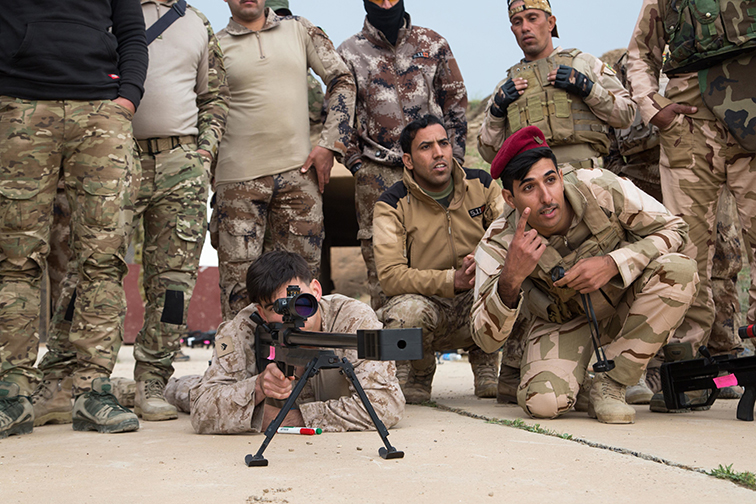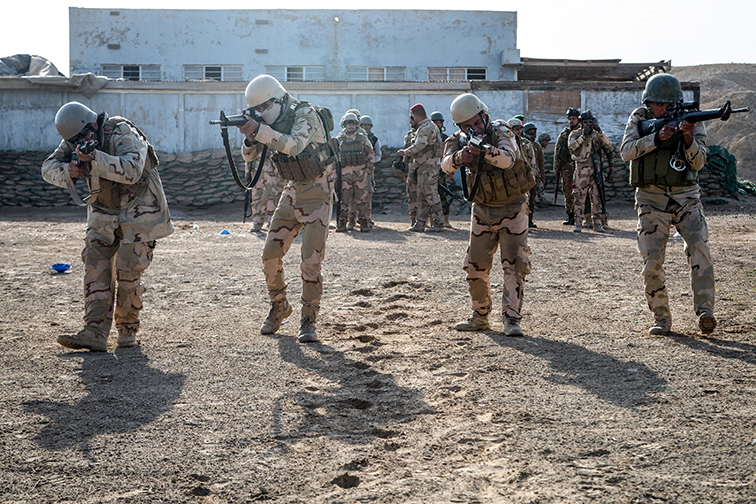WASHINGTON — A vote by the Iraqi parliament on Jan. 5 to expel U.S. troops in the country raises concerns about whether their absence will leave minority communities vulnerable to attacks by ISIS.
“These communities can least afford instability and violence because they’re hanging on by a thread as it is and desperately need a focus on rebuilding, returning and resettling in their towns,” said Peter Burns, director of government relations and policy of the advocacy group In Defense of Christians. “Another round of violence in Iraq may be the last straw.”
The vote by parliament was held after the Jan. 3 killing by the U.S. of Qassem Soleimani, the Iranian major general and commander of Iran’s Quds Force, and Abu Mahdi al-Muhandis, the deputy head of Iraq’s Popular Mobilization Units.
Despite the resolution passing Iraq’s assembly 170-0, 158 parliament members, mostly Sunni lawmakers including the Kurds, boycotted the vote. The decision is non-binding but puts pressure on Iraq’s temporary prime minister Adel Abdul Mahdi to expel foreign influence from his government.
Mahdi, who resigned in November amid protests that began in October over political corruption, continues to serve in his role until a new prime minister is selected. Mahdi supported parliament’s decision but has privately said he does not want U.S. troops to withdraw, according to a story from Al-Monitor earlier this month.

A U.S. Marine Corps sniper deployed in support of Combined Joint Task Force – Operation Inherent Resolve, assigned to Lima Company, 3rd Battalion, 7th Marine Regiment, 1st Marine Division demonstrates firing techniques during advanced marksmanship training at Camp Manion, Iraq, March 19, 2017. Coalition forces train ISF advanced combat skills in support of CJTF-OIR, the global Coalition to defeat ISIS in Iraq and Syria. (U.S. Army photo by Spc. Christopher Brecht)
U.S. TROOPS PROVIDE TRAINING AND SUPPORT
The 5,500 U.S. troops in the country do not directly provide security for Iraq’s Assyrian Christian and Yazidi communities, but they do provide training and support to Iraqi forces as well as fight alongside coalition partners against the Islamic State. Assyrians and Yazidis are ethnic communities indigenous to parts of Iraq, Turkey, Syria and Iran and make up nearly two percent of Iraq’s total population.
A strong coalition presence in Iraq makes Yazidis feel safer, especially with the continued risk of radical groups that have not been fully terminated, said Murad Ismail, executive director of Yazidi-relief organization YAZDA.
“Withdrawal will mostly likely create a vacuum that will be filled either by internal armed groups or give regional powers opportunity to intervene,” Ismail said. “Sinjar in particular will be at risk.”
The Sinjar District in northern Iraq was attacked by ISIS in August 2014 and led to the killing and abduction of thousands of Yazidis.
In December 2011, under an agreement with the Iraqi government, U.S. troops withdrew from the country. The Iraqi government failed to properly fill the gap in their absence, said Omar Mohammed, an Iraqi journalist formerly based in Mosul, and the people of the city lost their faith in the government.
“We were abandoned by the government,” he said. “We were left out.”
Forces assigned to protect the city began to feel the battle was not theirs to fight, Mohammed said, and this led to ISIS capturing the city in the summer of 2014. U.S.-led coalition forces, including Iraqi troops, liberated the city in 2017.
POTENTIAL PATH FOR ISIS RETURN
ISIS still has pockets of insurgents in the country because many retreating ISIS fighters are now fighting for Iran-backed militias, Mohammed said. These groups include not only Shiite militias but also militias formed by Sunni tribes that now have significant financial and political control over cities like Mosul.
“This is what we are afraid of, not that ISIS still has pockets but of those that are still controlling the public scene,” he said.
A few years after Mosul’s liberation, the feeling of abandonment lingers in Iraqis like Mohammed.
The city of Bartella, 20 miles east of Mosul, was once predominantly Christian, but the Christian population has reduced to less than a third of what it had been since its ISIS occupation, according to the Associated Press, who reported in 2019 that Assyrians are now afraid to return to the city because of intimidation by Iran-backed militias now controlling the town.
The city has soldiers from the Nineveh Plain Protection Units, a Christian mobilization force founded in 2014 to protect Assyrian communities in the Nineveh Plain, but leaders in Bartella said they need more protection because these soldiers are significantly outnumbered by Iran-backed militia forces.
U.S. WILL STAY FOR NOW
The Trump administration has expressed they do not intend to leave the country. A statement by the U.S. State Department said that any delegation sent to Iraq would discuss recommitting to a strategic partnership.
That same day, a NATO delegation discussed increasing their role in the country. Secretary of State Mike Pompeo added at a press briefing that the U.S. military presence in Iraq is very clear: train Iraqi security forces and fight the Islamic State. The U.S., Pompeo said, will continue that mission.
Not everyone agrees that a withdrawal of U.S. troops will leave minority communities more vulnerable. Shamiran Mako, an assistant professor of international relations at Boston University’s school of global studies, said that Assyrians are unsafe whether Americans stay or leave.
“Americans have been in Iraq since 2003, and Assyrian numbers have dwindled drastically since the invasion,” she said.
Bahra Dawood, who lives in Erbil’s Assyrian suburb of Ankawa, said that decisions on either side are rarely made for the people.
“As long as our nation is not one hand, we will never survive,” she said. “The power is in our own hands.”

